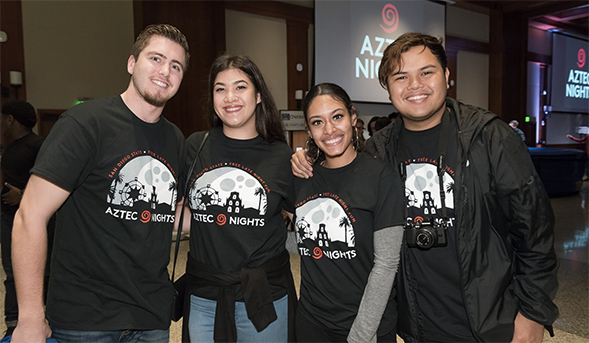SDSU Committed to Student Safety and Well-Being
The university provides students with an array of programming and intervention strategies related to alcohol and other drugs.

San Diego State University's comprehensive plan to identify and reduce risks associated with alcohol and other drug use among the student body includes innovative programming and intervention strategies.
The rates of alcohol use among SDSU students have been below the national average for several years, with university research indicating that about 30% of the student body does not consume alcohol at all in a typical week. Further, the university is seeing a reduction in the numbers of students who need medical attention due to alcohol use.
Higher education research studies have shown that higher uses of alcohol among college students is linked to negative academic outcomes, such as lower grade point averages and lower retention. Given this research and SDSU’s commitment to supporting the safety and well-being of students, the university has prioritized support for programming and resources related to alcohol and other drugs. “The use of alcohol and drug on campuses has come into sharp focus for universities across the nation,” said Randy Timm, Dean of Students and Associate Vice President for Student Affairs. “SDSU has implemented a multi-pronged and comprehensive approach to address this issue. This has led to sweeping changes and innovative ways of offering better support and resources to students.”
SDSU offers programming and intervention strategies that serve as models for other universities, including the evidence-based eCHECKUP TO GO for all incoming students, said Stephanie Waits Galia, director of SDSU’s Well-being & Health Promotion Department. “Many controlled research studies have demonstrated reductions in use and associated consequences after completing,” Waits Galia said. “The program was created at SDSU and is now used on more than 600 campuses worldwide.”
Aztec Nights, which are substance-free social events that focus on safe and healthy ways for students to get connected to the SDSU community. The events series launched with the start of the academic year and continues through the end of September. This year, more than 11,000 SDSU students participated in Aztec Nights and Welcome Week programming during the first week of classes.
The Peer Health Education program offers training to students so that they may educate other students on health and safety issues, including alcohol and other drug use. Another set of programs, FratMANners and SISSTER, is designed for fraternities and sororities, educating them on the importance of sexual violence prevention and the connection between sexual violence and alcohol and other drugs. Additional programming occurs in the residence halls and the Commuter Resource Center during the first few weeks of the academic year.
For more information on safety measures, programs and resources at SDSU, visit the Division of Student Affairs website.
“Our student body has become notably aware and vocal about these issues and we have found that, over the years, students themselves are initiating these conversations and calling for more responsibility among their peer groups,” said Caryl Montero-Adams, director of Student Life & Leadership. “There has been such a transformative change on our campus and in our campus culture over the years. Much of that change is because our students are taking these issues so seriously, as we do, and being accountable.”



